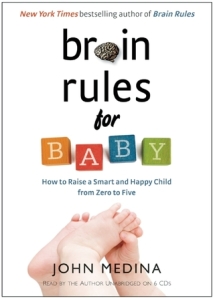 John J. Medina is a developmental molecular biologist, research consultant, author of New York Times bestseller Brain Rules: 12 Principles for Surviving and Thriving at Work, Home, and School, and a father.
John J. Medina is a developmental molecular biologist, research consultant, author of New York Times bestseller Brain Rules: 12 Principles for Surviving and Thriving at Work, Home, and School, and a father.
This father of two boys believes (pg 3) that “Parents need facts, not just advice, about raising their children…parenting is about brain development.” He says that this book is “meant to let you know what scientists know – without having a Ph.D. to understand it.”
Debunking Myths, Stating Truths
Medina happily debunks myths and confidently states the truths such as (pg 4):
Myth: Playing Mozart to your womb will improve baby’s future math scores.
Truth: If you want her to do well in her later years, the greatest thing you can do is to teach the child impulse control in her early years.
Myth: To boost their brain power, children need French lessons by age 3, and a room piled with ‘brain-friendly’ toys and a library of educational DVDs.
Truth: The greatest paediatric brain-boosting technology…is probably a plain cardboard box, a fresh box of crayons, and two hours. The worst is probably your new flat-screen TV. Here, Medina explains that ‘open-ended play’ fertilizes a kid’s brain and is as important to his neural growth as protein.
22 Brain Rules across 5 areas
Medina divides the book into 5 topics:
1. Pregnancy
2. Relationship
3. Smart Baby
4. Happy Baby
5. Moral Baby
In the ‘Pregnancy’ chapter, Medina discusses the ‘Goldilocks Effect’, a term scientists use to describe the phenomenon where too much or too little of something often proves unhelpful. He explains how maintaining a balancing act and doing things in ‘Just Right’ doses will prove beneficial for mothers-to-be and boost babies’ brain development at the same time.
He formulates 22 note-worthy ‘Brain Rules’ – things we know for sure about how the early-childhood brain works (pg 260 – 275) and encapsulates these in ‘Practical Tips’, compiled based on the his own parenting experience and what worked for his family.
These help readers navigate the contents of the book and enable parents to better understand how the researched content applies to the real world of parenthood.
Examples in ‘Happy Baby’ include:
Rule #15: Emotions are just Post-it notes – telling the brain to pay attention to something.
Rule #19: Labeling emotions calms big feelings – acknowledging or naming (but not judging) emotions has a neurologically calming effect.
Seed & Soil
Medina uses an interesting ‘Seed and Soil’ metaphor. He asserts (pg 10), “there are some factors parents can’t control and some they can. There’s seed, and there’s soil. All the nurture in the world won’t change the fact that 50 percent of your child’s potential is genetic.”
The professional geneticist opines nevertheless, “That said…I am convinced we can exert far more influence over our kids’ behaviour than is popularly imagined. It’s a very, very big job that takes a lot of work.”
Both nature and nature are needed to get the desired results. He rationalises: Parenting is necessary because human babies are “brought into the world before their brains are fully developed…a baby’s brain simply isn’t ready to survive the world.”
In ‘Happy Baby: Seeds’, the author, citing consistent results of research conducted over many decades, says (pg 165), “The only thing that really matters in life are your relationships to other people…Successful friendships, the messy bridges that connect friends and family, are what predict people’s happiness as they hurtle through life.”
In ‘Happy Baby: Soil’, he discusses the importance and ways of creating an environment conducive to a child’s happiness. He notes (pg 213), “Parents who raise the happiest kids constantly rummage through their offspring’s intense feelings looking for stray teachable moments. They seem to have an intuitive sense that people produce lasting change only in response to a crisis.”
In ‘Smart Baby: Seed’, the writer explores the multiple ingredients that make up intelligence.
In ‘Smart Baby: Soil’, the author reiterates, amongst others, the importance of strong emotional regulation in improving a child’s academic performance.
Key points & central themes
At the end of each chapter, Medina delivers succinct ‘Key Points’ which are incredibly useful summarised pointers for parents to take away.
The book consistently focuses on two central themes, namely, ’empathy’ and the importance of ‘paying attention to a child’s emotions’. Medina drives home the single most-important message from his book: Be willing to enter into your child’s world on a regular basis and to empathize with what your child is feeling. The behaviour of good parenting follows from this attitude.
Giving, but also getting
The concluding chapter is well worth a read. It provides heart-warming glimpses on what parenthood means to the author.
He reflects, “As you enter into your child’s emotional world, your own becomes deeper. Every time I chose to put my children’s priorities ahead of my own, even when I didn’t feel like it, I found I was learning to love more honestly…In the messy work of child rearing, it’s startling how profoundly a two-way street the social contract actually is. You may think grown-ups create children. The reality is that children create grown-ups…Children give so much more than they take.”
To him, “Kids present you with…a tantrum, but they are really giving you the honor of witnessing a developing personality…You realize what a great privilege it is to be a steward of another life.”
Brain & Heart
As readers gain insight from this book written by the father-scientist, the author’s own admission and self-realisation may also resonate: Parenting is not all about developing human brains, it is about developing hearts.
Get hold of a copy of Brain Rules for Baby – How to Raise a Smart and Happy Child from Zero to Five from Singapore’s Public Libraries.
